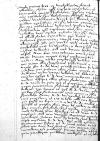List #2997
Stanisław HOZJUSZ (HOSIUS) do Ioannes DANTISCUSCracow (Kraków), 1546-09-19
| odebrano Graudenz (Grudziądz), 1546-09-29 Rękopiśmienne podstawy źródłowe:
Publikacje:
| ||||||
Tekst + aparat krytyczny + komentarzZwykły tekstTekst + komentarzTekst + aparat krytyczny
Reverendissimo in Christo Patri et Domino, domino
Reverendissime in Christo Pater et Domine, domine colendissime.
Officiosissimam servitutis meae commendationem.
Reddidit mihi
Palatinum Pomeraniae, Deo sit gratia, habemus eum,
Dominus
De Germanicis tumultibus ne apud nos quidem certi quicquam, praeter hoc, quod numero, experientia et omnium rerum copia caesar esse dicitur rebellibus superior.  AAWO, AB, D. 19, No.65_2 Ante paucos dies ex
AAWO, AB, D. 19, No.65_2 Ante paucos dies ex
Postulavit a me nepos hic Reverendissimae Dominationis Vestrae, quandoquidem de villa hidden by binding⌈[a]a hidden by binding⌉ quadam per patrem olim suum empta in dubium nunc vocari videtur, ut litteris meis hidden by binding⌈[is]is hidden by binding⌉ causam ipsius Reverendissimae Dominationi Vestrae commendarem. Etsi autem absque illis etiam facturam esse scio Reverendissimam Dominationem Vestram ea, quae ius et q aequum postulat, neque immemorem futuram, quid sanguini suo hidden by binding⌈[o]o hidden by binding⌉ debeat. Rogo tamen et ipse Reverendissimam Dominationem Vestram, quandoquidem spes fortunarum eius omnis a sola, secundum Deum, Reverendissima Dominatione Vestra pendet, ut rationibus hidden by binding⌈[us]us hidden by binding⌉ eius providere et eas in tuto collocare dignetur hidden by binding⌈[r]r hidden by binding⌉, quo possit iis bonis, quae a Vestra Reverendissima Dominatione nactus est hidden by binding⌈[t]t hidden by binding⌉, quiete et pacifice frui. Nam, ut audio, in illius haec omnia potestate sunt posita. Cogitabat is hidden by binding⌈[s]s hidden by binding⌉ ante triduum hinc discedere et ad Vestram Reverendissimam Dominationem proficisci, sed cum venisset
Interea vero distributae sunt dignitates hidden by binding⌈[tes]tes hidden by binding⌉ iuxta consilium Reverendissimae Dominationis Vestrae, nisi quod officium succamerarii datum est domino  AAWO, AB, D. 19, No.65_3 esset renuntiatus, quem nemo sperabat. Sed ei rei
AAWO, AB, D. 19, No.65_3 esset renuntiatus, quem nemo sperabat. Sed ei rei
Deum precor, ut Reverendissimam Dominationem Vestram diu servet incolumem et omni felicitatis genere cumulet. Cuius me gratiae commendo.
Eiusdem Reverendissimae Dominationis Vestrae servitor deditissimus



